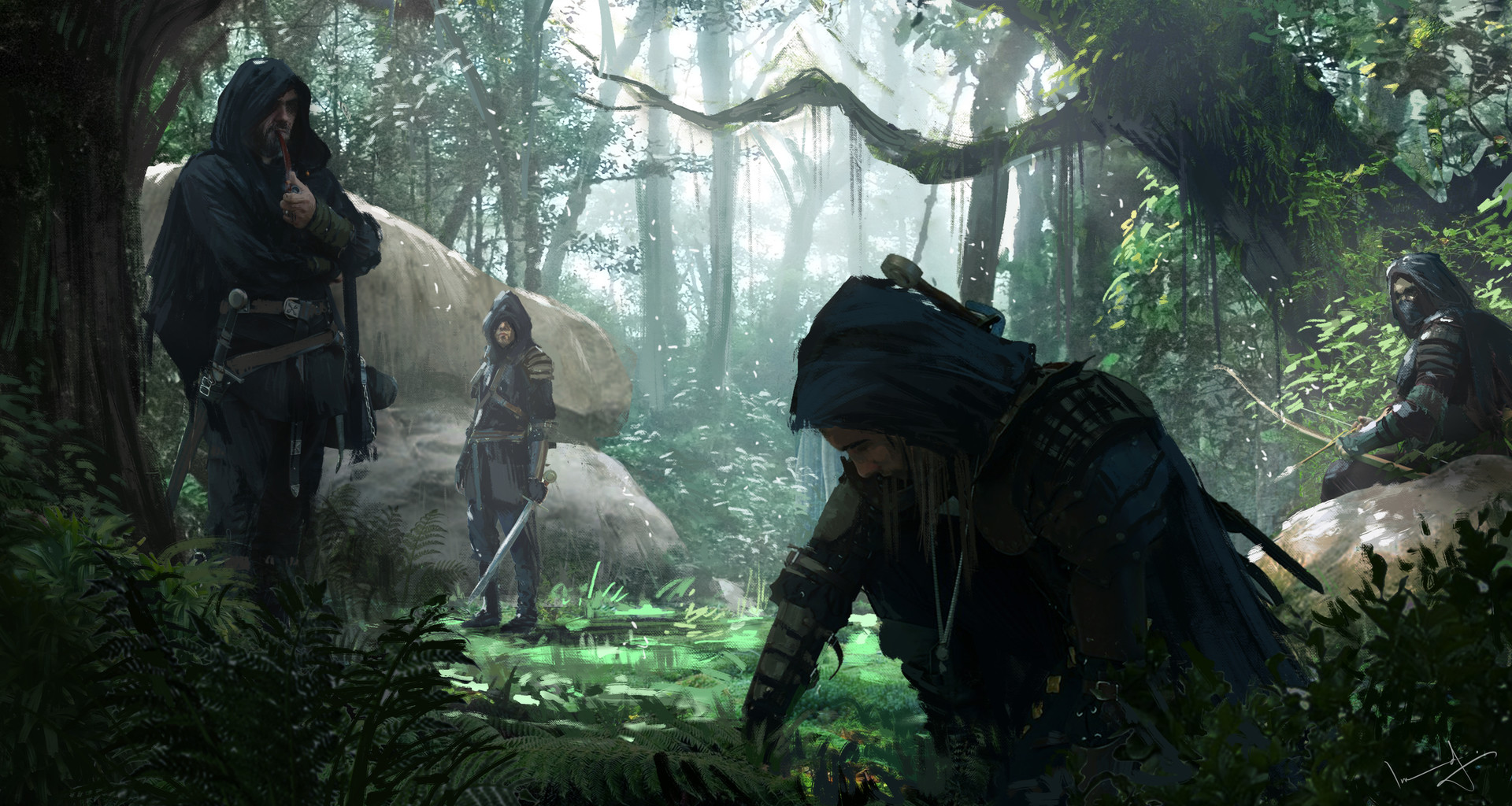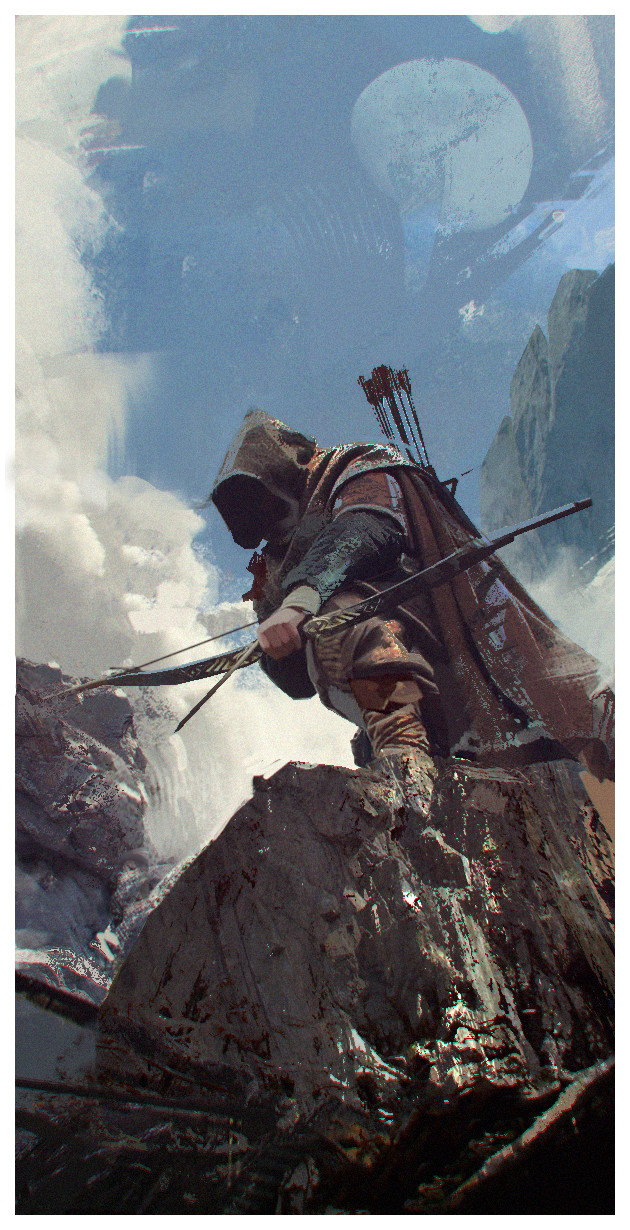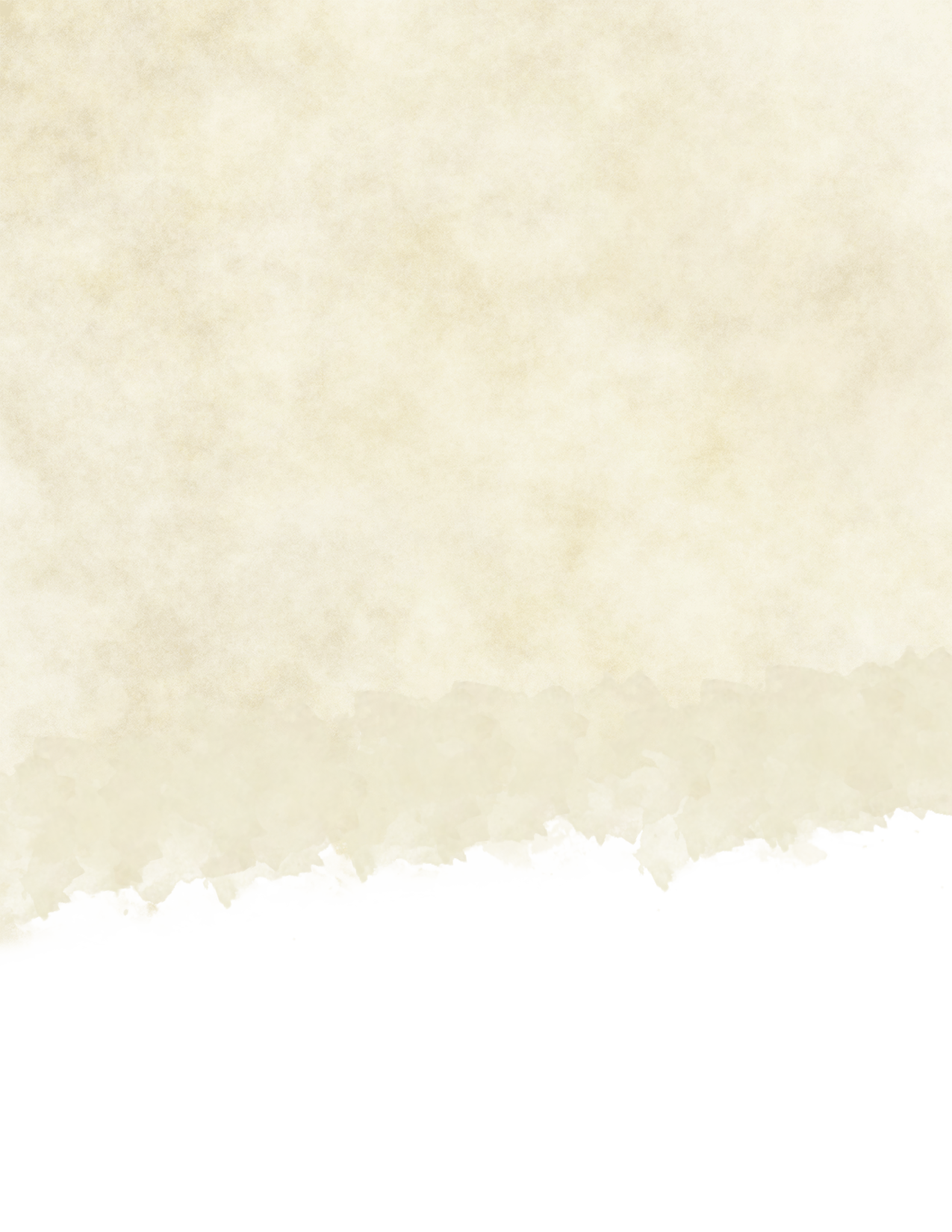
The Ranger
| Level | Proficiency Bonus | Features | Marked Foe | 1st | 2nd | 3rd | 4th | 5th |
|---|---|---|---|---|---|---|---|---|
| 1st | +2 | Marked Foe, Natural Explorer, Primeval Awareness |
1 | — | — | — | — | — |
| 2nd | +2 | Fighting Style, Spellcasting | 1 | 2 | — | — | — | — |
| 3rd | +2 | Marked for Death, Ranger Archetype | 2 | 3 | ─ | — | — | — |
| 4th | +2 | Ability Score Improvement | 2 | 3 | ─ | — | — | — |
| 5th | +3 | Extra Attack | 2 | 4 | 2 | — | — | — |
| 6th | +3 | Natural Explorer improvement | 2 | 4 | 2 | — | — | — |
| 7th | +3 | Ranger Archetype feature | 2 | 4 | 3 | — | — | — |
| 8th | +3 | Ability Score Improvement | 2 | 4 | 3 | — | — | — |
| 9th | +4 | ─ | 2 | 4 | 3 | 2 | — | — |
| 10th | +4 | Natural Explorer improvement | 3 | 4 | 3 | 2 | — | — |
| 11th | +4 | Ranger Archetype feature | 3 | 4 | 3 | 3 | — | — |
| 12th | +4 | Ability Score Improvement | 3 | 4 | 3 | 3 | — | — |
| 13th | +5 | ─ | 3 | 4 | 3 | 3 | 1 | — |
| 14th | +5 | Relentless Hunter | 3 | 4 | 3 | 3 | 1 | — |
| 15th | +5 | Ranger Archetype feature | 3 | 4 | 3 | 3 | 2 | — |
| 16th | +5 | Ability Score Improvement | 3 | 4 | 3 | 3 | 2 | — |
| 17th | +6 | ─ | 4 | 4 | 3 | 3 | 3 | 1 |
| 18th | +6 | Master of the Wilds | 4 | 4 | 3 | 3 | 3 | 1 |
| 19th | +6 | Ability Score Improvement | 4 | 4 | 3 | 3 | 3 | 2 |
| 20th | +6 | Foe Slayer | 4 | 4 | 3 | 3 | 3 | 2 |
Ranger
The Ranger class is an official 5th Edition Dungeons & Dragons class, and this homebrew revision attempts to unify the many iterations of the class's mechanics, by selecting and combining the most popular and well received of these mechanics into a single version.
Creating a Ranger
As you create your ranger character, consider the nature of the training that gave you your particular capabilities. Did you train with a single mentor, wandering the wilds together until you mastered the ranger's ways? Did you leave your apprenticeship, or was your mentor slain by a fearsome monster? Or perhaps you learned your skills as part of a band of rangers affiliated with a druidic circle, trained in mystic paths as well as wilderness lore.
What is it that drove you to live on the fringes, protecting civilization from unseen threats? Is your adventuring career a continuation of your work in protecting the borderlands, or a significant change?
What made you join up with a band of adventurers? Do you find it challenging to teach new allies the ways of the wild, or do you welcome the relief from solitude that they offer?
Quick Build
You can make a ranger quickly by following these suggestions. First, make Dexterity your highest ability score, followed by Wisdom. (Some rangers who focus on two-weapon fighting make Strength higher than Dexterity.) Second, choose the outlander background.
Class Features
As a ranger, you gain the following class features.
Hit Points
- Hit Dice: 1d10 per ranger level
- Hit Points at 1st Level: 10 + your Constitution modifier
- Hit Points at Higher Levels: 1d10 (or 6) + your Constitution modifier per monster level after 1st



Proficiencies
- Armor: Light armor, medium armor, shields
- Weapons: Simple weapons, martial weapons
- Tools: None
- Saving Throws: Strength, Dexterity
- Skills: Choose any three from Animal Handling, Athletics, Insight, Investigation, Nature, Perception, Stealth, and Survival
Equipment
You start with the following equipment, in addition to the equipment granted by your background:
- (a) scale mail or (b) leather armor
- (a) two shortswords or (b) two simple melee weapons
- (a) an explorer's pack or (b) a dungeoneer's pack
- A longbow and a quiver of 20 arrows
Natural Explorer
You are an unsurpassed explorer and survivor, the wilds of the world more familiar to you than any city, your family the creatures that roam the fringes beside you. You ignore difficult terrain.
Additionally, choose one of the following benefits, and then choose another one at 6th and 10th level.
Canny
Choose one skill: Animal Handling, Athletics, History, Insight, Investigation, Medicine, Nature, Perception, Stealth, or Survival. You gain proficiency in the chosen skill if you don’t already have it, and you can add double your proficiency bonus to ability checks using that skill.
In addition, thanks to your extensive wandering, you are able to speak, read, and write two languages of your choice.
Roving
Your walking speed increases by 5, and you gain a climbing speed and a swimming speed equal to your walking speed.
Tireless
As an action, you can give yourself a number of temporary hit points equal to 1d10 + your Wisdom modifier. You can use this special action a number of times equal to your Wisdom modifier (a minimum of once), and you regain all expended uses when you finish a long rest.
In addition, whenever you finish a short rest, your exhaustion level, if any, is decreased by 1.
Guided
You gain a beast companion, a stalwart ally in your travels through the wilds. When choosing such a creature, you decide whether it is a Beast of the Air or the Earth, and you determine its appearance. In combat, the beast shares your initiative count, but it takes its turn immediately before yours. It can move on its own, but the only action it takes on its turn is the Dodge action, unless you take a reaction on its turn to command it to take one of the actions in its stat block or the Dash, Disengage, Help, Hide, or Search action.
When you reach 11th level, the AC of any beast companion you have increases by 4, if its AC has not already been increased by a different feature.



If the beast dies, you can obtain another one by spending 8 hours magically bonding with another beast that isn't hostile to you, either the same type of beast as before or a different one. Alternatively, you can spend 8 hours praying to the wilds, magically summoning a beast companion within 5 feet of you. If you spend 8 hours performing one of these actions while you already have a beast companion, your current companion leaves and is replaced by your new beast companion.
Beast of the Air
Small beast, neutral
- Armor Class 13 (natural armor)
- Hit Points equal the beast’s Constitution modifier + your Wisdom modifier + five times your ranger level (the beast has a number of Hit Dice [d6s] equal to your ranger level)
- Speed 10 ft., fly 60 ft.
STR DEX CON INT WIS CHA 6 (-2) 16 (+3) 13 (+1) 8 (-1) 14 (+2) 11 (+0)
- Saving Throws Dex +5, Con +3, Wis +4
- Skills Perception +4, Stealth +5
- Senses darkvision 60 ft., passive Perception 14
- Languages understands the languages you speak
Flyby. The beast doesn’t provoke opportunity attacks when it flies out of an enemy’s reach.
Might of the Master. The following numbers increase by 1 when your proficiency bonus increases by 1: the beasts's skill and saving throw bonuses (above), the bonuses to hit and damage of its shred attack (below), and its AC.
Primal Rebirth. If the beast has died within the last hour, you can use your action to touch it and expend a spell slot of 1st level or higher. The beast returns to life after 1 minute with all its hit points restored.
Actions (Requires Your Reaction)
Shred. Melee Weapon Attack: +5 to hit, reach 5 ft., one target. Hit: 1d6 + 3 slashing damage.
Beast of the Land
Medium beast, neutral
- Armor Class 12 (natural armor)
- Hit Points equal the beast’s Constitution modifier + your Wisdom modifier + five times your ranger level (the beast has a number of Hit Dice [d8s] equal to your ranger level)
- Speed 40 ft., climb or swim 40 ft. (your choice when you bond with the beast)
STR DEX CON INT WIS CHA 14 (+2) 14 (+2) 15 (+2) 8 (-1) 14 (+2) 11 (+0)
- Saving Throws Dex +4, Con +4, Wis +4
- Skills Perception +4, Stealth +4
- Senses darkvision 60 ft., passive Perception 14
- Languages understands the languages you speak
Charge. If the beast moves at least 20 feet straight toward a target and then hits it with a maul attack on the same turn, the target takes an extra 1d6 slashing damage. The DC equals your spell save DC. If the target is a creature, it must succeed on a Strength saving throw against your spell save DC or be knocked prone.
Might of the Master. The following numbers increase by 1 when your proficiency bonus increases by 1: the beasts's skill and saving throw bonuses (above), the bonuses to hit and damage of its maul attack (below), and its AC.
Primal Rebirth. If the beast has died within the last hour, you can use your action to touch it and expend a spell slot of 1st level or higher. The beast returns to life after 1 minute with all its hit points restored.
Actions (Requires Your Reaction)
Maul. Melee Weapon Attack: +4 to hit, reach 5 ft., one target. Hit: 1d8 + 2 slashing damage.



Marked Foe
Your prowess as a hunter allows you to focus your senses on a creature, marking them as your quarry. As a bonus action, you can choose a number of enemies you can see within 90 feet of you and mark them as your foe. The number of enemies you can mark is shown in the Marked Foe column of the ranger table. Whenever you hit the marked foe with an attack, you deal an extra 1d6 damage to the marked creature, and you have advantage on any Wisdom (Perception) or Wisdom (Survival) check you make to find it. A creature marked in this way remains so for 1 hour, until it dies, or you are incapacitated.
You regain all expended uses of this ability when you finish a short or long rest.
Additionally, when you gain the spellcasting feature at 2nd level, you can expend a spell slot of 1st level or higher to mark one or more foes with this ability. For each spell level above first, you can mark an extra foe.
Primeval Awareness
The world around you speaks to you in a way that falls deaf on the ears of others, allowing you preternatural reflexes and otherworldly perceptiveness. You have advantage on initiative rolls, and as an action you can open your senses, gaining the following benefits until the end of your turn:
- You know if there are any invisible creatures within 30 feet of you, as long as they are not behind total cover. You do not know their location, but are aware of their presence.
- You know the amount and type of all creatures that have been within a 30 foot radius of where you are within the past 8 hours, if any.
Fighting Style
At 2nd level, you adopt a particular style of fighting as your specialty, Choose one of the following options. You can't take a Fighting Style option more than once, even if you later get to choose again.
Archery
You gain a +2 bonus to attack rolls you make with ranged weapons.
Defense
While you are wearing armor, you gain a +1 bonus to AC.
Dueling
When you are wielding a melee weapon in one hand and no other weapons, you gain a +2 bonus to damage rolls with that weapon.
Two-Weapon Fighting
When you engage in two-weapon fighting, you can add your ability modifier to the damage of the second attack.
Spellcasting
By the time you reach 2nd level, you have learned to use the magical essence of nature to cast spells, much as a druid does. See chapter 10 for the general rules of spellcasting and chapter 11 for the ranger spell list.
Preparing and Casting Spells
The Ranger table shows how many spell slots you have to cast your spells of 1st level and higher. To cast one of these ranger spells, you must expend a slot of the spell's level or higher. You regain all expended spell slots when you finish a long rest.
You prepare the list of ranger spells that are available for you to cast, choosing from the ranger spell list. When you do so, choose a number of ranger spells equal to your Wisdom modifier + half your ranger level, rounded down (minimum of one spell). The spells must be of a level for which you have spell slots.
For example, if you are a 5th-level ranger, you have four 1st-level and two 2nd-level spell slots. With a Wisdom of 16, your list of prepared spells can include five spells of 1st or 2nd level, in any combination. If you prepare the 1st level spell cure wounds, you can cast it using a 1st-level or 2nd-level slot. Casting the spell doesn't remove it from your list of prepared spells.
You can also change your list of prepared spells when you finish a long rest. Preparing a new list of ranger spells requires time spent in prayer and meditation: at least 1 minute per spell level for each spell on your list.
Spellcasting Ability
Wisdom is your spellcasting ability for your ranger spells, since your magic draws on your attunement to nature. You use your Wisdom whenever a spell refers to your spellcasting ability. In addition, you use your Wisdom modifier when setting the saving throw DC for a ranger spell you cast and when making an attack roll with one.
Spell save DC = 8 + your proficiency bonus +
your Wisdom modifier
Spell attack modifier = 8 + your proficiency bonus +
your Wisdom modifier
Ranger Archetype
At 3rd level, you choose to emulate the ideals and training of a ranger archetype. Your choice grants you features at 3rd level and again at 7th, 11th, and 15th level.
Marked for Death
Also at 3rd level, you can expend multiple uses of your Marked Foe ability against a single creature. For each use above the first, you gain a +1 bonus to attack and damage rolls made against the targeted creature, and nonmagical attacks count as magical for the purposes of overcoming resistance to nonmagical attacks and damage.
Ability Score Improvement
When you reach 4th level, and again at 8th, 12th, 16th, and 19th level, you can increase one ability score of your choice by 2, or you can increase two ability scores of your choice by 1. As normal, you can't increase an ability score above 20 using this feature.
Extra Attack
Beginning at 5th level, you can attack twice, instead of once, whenever you take the Attack action on your turn.
Relentless Hunter
At 14th level, when you use your Marked Foe ability, its duration is increased to 24 hours, and you always know the direction and distance of a marked foe as long as they are on the same plane of existence as you. Also, you can't be tracked by nonmagical means, unless you choose to leave a trail.
Master of the Wilds
By 18th level, untamed and wild places revere your very presence. You gain half cover against attacks made against you while you are lightly obscured from the attacker.
Additionally, while allies are within 60 feet of you, they ignore difficult terrain.
Foe Slayer
When you reach 20th level, you have become a hunter of peerless skill. Your Marked Foe damage die becomes a d12.
Ranger Archetypes
Across the wilds, rangers use many different skills and tactics, depending on the local terrain terrain and the creatures that dwell their. A ranger's archetype determines the style of these tactics.
Ranger Subclasses
This homebrew revision is designed to be compatible with all official ranger subclasses, changing only the Beast Master archetype for the purpose of giving all rangers the option of having a beast companion.
Beast Master
Many rangers are more at home in the wilds than in civilization, to the point where animals consider them kin. Rangers of the Beast Master archetype develop a close bond with a beast, then further strengthen that bond through the use of magic.
Beast Companion
At 3rd level, you learn to use your magic to create a powerful bond with a creature of the natural world. You gain the Guided option from the Natural Explorer feature. If you have already taken this option, you can instead choose another option from the Natural Explorer feature at this level.
You can now choose a beast companion that is no larger than Medium and that has a challenge rating of 1/4 or lower (appendix D in the Player's Handbook presents statistics for the hawk, mastiff, and panther as examples), or a Beast of the Air or Beast of the Land. You can also choose to keep your Beast of the Air or Beast of the Land, if one already accompanied you.
Any beast companion bonded to you loses the Might of the Master ability if they have it, and gains the the Primal Rebirth ability if they do not have it. They also lose access to their Multiattack, if they have one.
You add your proficiency bonus to your beast companion's AC, attack rolls, and damage rolls, as well as to any saving throws and skills it is proficient in. Its hit point maximum equals its Constitution modifier + your Wisdom modifier + five times your ranger level (the beast has a number of Hit Dice (d10s) equal to your ranger level).
Excpetional Training
At 7th level, you've trained your beast companion to hunt at your side. When you gain a benefit from your Marked Foe ability, your beast companion gains the same benefit.
Bestial Fury
Starting at 11th level, your beast companion can make two attacks when you command it to use the Attack action.
